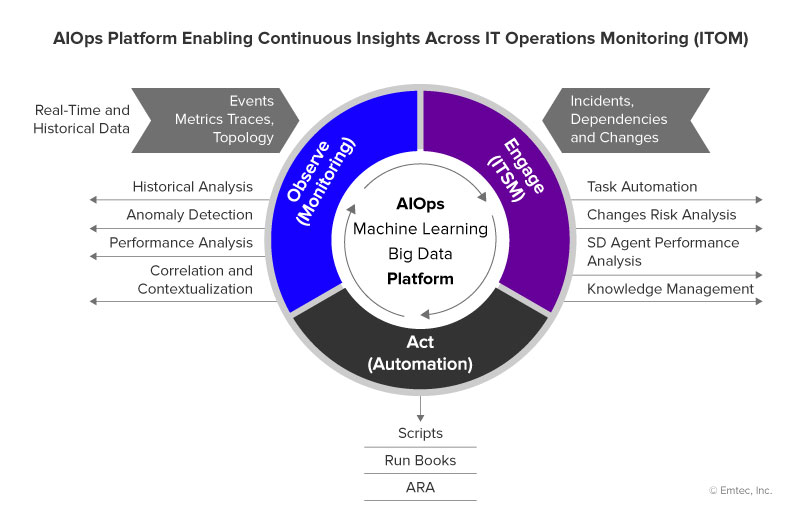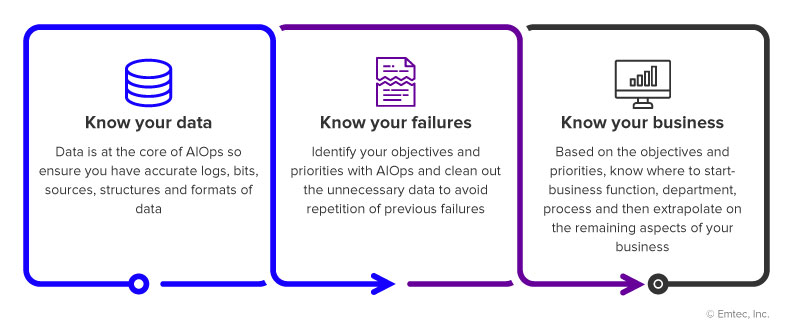In our previous blog, we explored DataOps, a common technical platform where you can plug-in data and tools from diverse business processes for centralized processing and cross-functional insights. Going a step further, let’s dive into the hidden world of AIOps to understand how we can replace manual operations with smarter, faster, and machine-driven business operations.
The term AIOps was coined by Gartner in 2016. In the Market Guide for AIOps Platforms, Gartner describes AIOps platforms as “software systems that combine big data and artificial intelligence (AI) or machine learning functionality to enhance and partially replace a broad range of IT operations processes and tasks, including availability and performance monitoring, event correlation and analysis, IT service management and automation.”
Understanding how AIOps differs from DataOps and MLOps
Gartner coined the term AIOps which combines big data and machine learning to automate IT operations processes, including event correlation, anomaly detection, and causality determination. Here is how AIOps differs from DataOps and MLOps –
| DataOps | MLOps | AIOps |
|---|---|---|
| DataOps aims to reduce costs, simplify, augment, and enhance data analytics-related operations. | MLOps aims to operationalize tasks for teams working with Machine Learning to continue building sustainable business models. | The ultimate objective AIOps is to continuously develop and deploy agile applications to improve the digital services they provide and enhance IT Operations over time. |
How AI enhances DataOps
With the massive increase in organizational data, automation is key to ensure error-free, accurate, rapid, and smooth operations. AI-based tools, which leverage big data, can enhance IT operations by detecting patterns and anomalies to generate meaningful insights for more data-driven decisions and improved business processes.
Critical activities like data monitoring, visualization and reporting can all be automated using AI in DataOps to reduce manual labor and increase collaboration and productivity.

Who can benefit from AIOps?
If you fall into any of the categories below, you can benefit from implementing AIOps.
- Enterprises undergoing digital transformation
- Ambitious organizations with extensive and complex business processes
- Cloud-first organizations
- Organizations undergoing on-premise to cloud migration
- Organizations leveraging DevOps for application development and execution
AIOps Benefits: Enable autonomous operations to accelerate digital transformation
- According to Gartner, added efficiency, enhanced productivity, and time and cost savings are just a few of the many benefits AIOps provides. AIOps helps organizations forecast trends and enable smarter business decision-making for enhanced market readiness by combining a myriad tools and technologies across big data, data integration, and intelligent automation.
- AIOps helps organizations conduct Root Cause Analysis (RCA) for challenges across the business, without the hassle of accessing multiple tools. It also leverages historical data to prevent similar challenges in the future.
- AIOps provides increased efficiency, faster remediation, improved user experience, and reduced operational complexity. This is expected to be largely obtained through the automation capabilities of AIOps, including automation of data analysis and root cause, as well as predictive insights.
- AIOps helps prevent the disruption of critical digital services by accelerating detection and resolution.
- As an AIOps-focused and data-rich organization, you can deliver phenomenal digital experiences to your customers, employees, and other stakeholders.
Prerequisites to Implement AIOps
Implementing AIOps enhances the organizational ability to implement and leverage AI. Here are some prerequisites to implement AIOps in your technical infrastructure-

Avoid failure with AIOps
With any new transformational project, the challenge lies with its organization-wide implementation and application. To avoid failure, certain pitfalls and hurdles should be avoided or prevented. Here are a few steps to ensure a successful AIOps implementation-
- Avoid data silos
- Avoid irrelevant data collection and storage
- Share data across organization
- Govern data for relevance, accuracy, updates, biases
Future of AIOps
According to the 2021 Gartner Market Guide for AIOps Platforms, “There is no future of IT operations that does not include AIOps. This is due to the rapid growth in data volumes and pace of change (exemplified by the rate of application delivery and event-driven business models) that cannot wait on humans to derive insights.”
Want to learn more about implementing organization wide AIOps to accelerate your Digital Transformation journey? Contact our experts today!
References
https://splk.it/3J2G76k
https://www.gartner.com/en/information-technology/glossary/aiops-artificial-intelligence-operations



